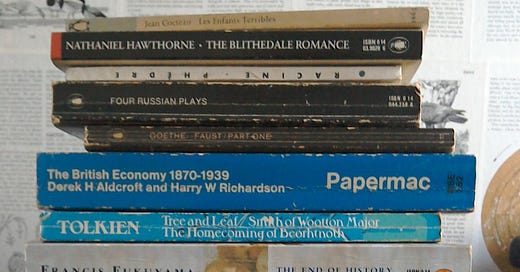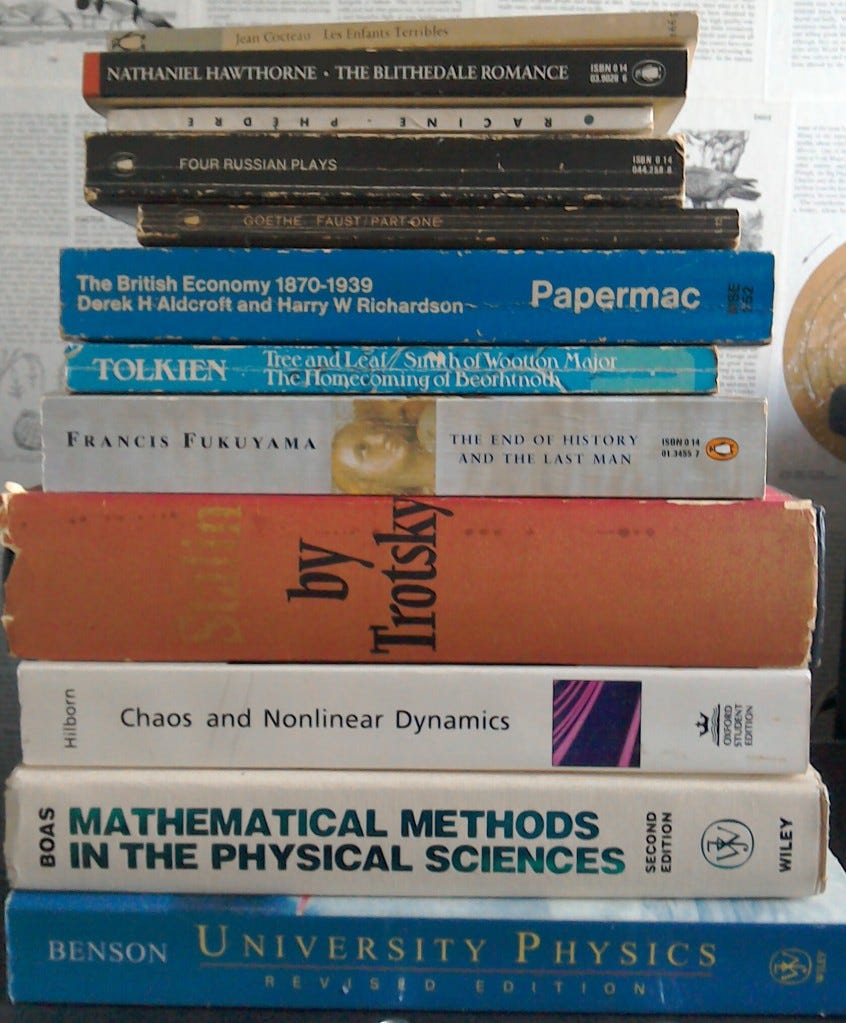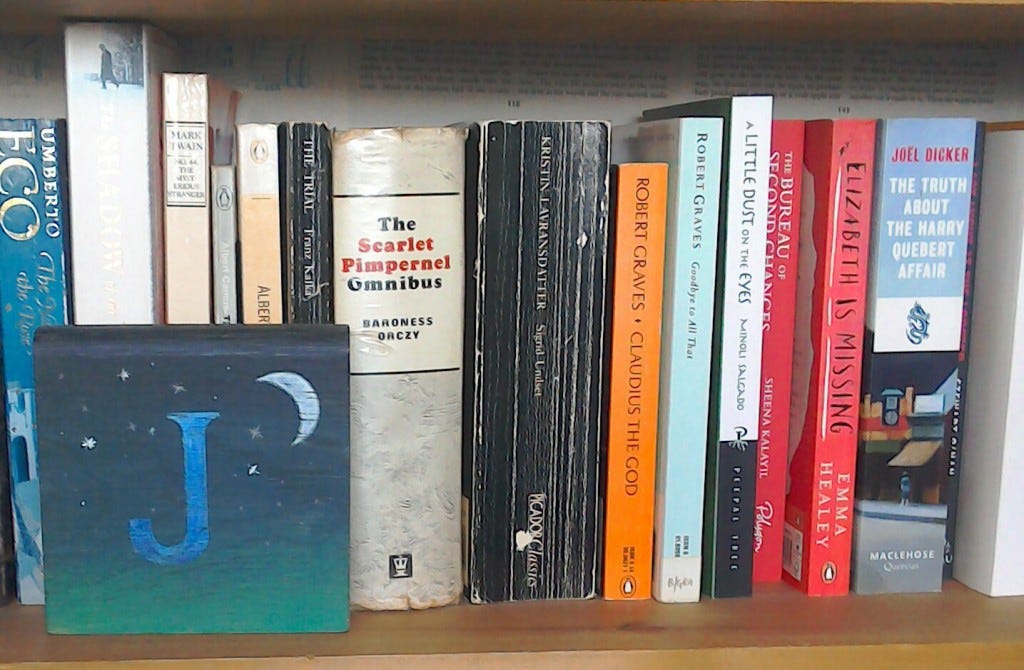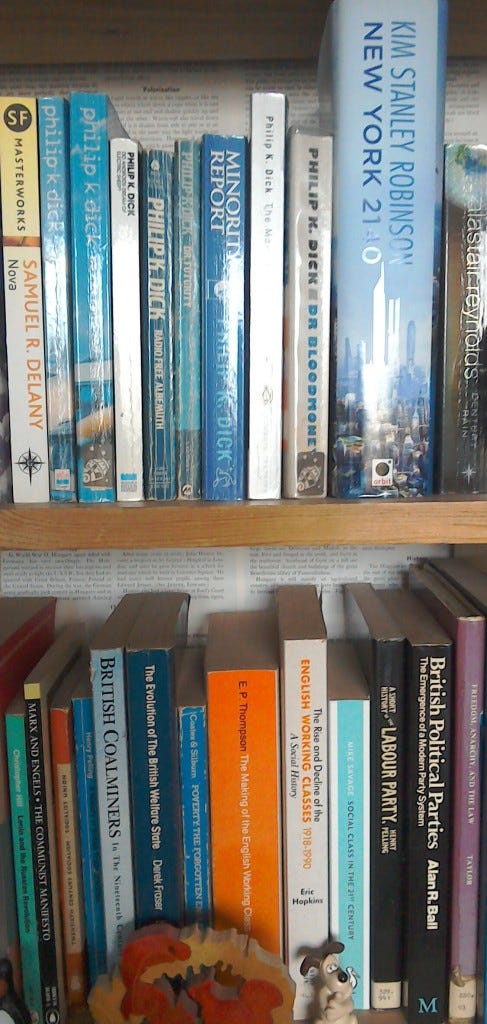Why own books?
I don't mean why buy books, rather why bother hanging onto them once you've read them? Spending lockdown staring at our bookshelves and wondering why we had so many books, and how many we'd actually read, OneMonkey and I had a cull recently.
There are piles of books lying around our flat now, waiting for the charity shops to reopen so we can pass them on. They are mainly mine. Books that were my undergraduate set texts more than twenty years ago, second-hand books I haven't read and can now admit I never will, books I have read but won't read again. As we went through each shelf deciding which books to keep and which to jettison, it made me think about where I got them and why I kept them in the first place.
When I was a teenager, in fact probably into my early twenties, I stocked up on the books I thought I 'ought' to read. The ones I thought might be impressive (to whom?) on the bookshelves in my student digs. With the aid of the new Wordsworth cheap editions and the clearance shelf in Thornes and/or Dillons in Newcastle I got Tolstoy and Turgenev, Nathaniel Hawthorne and Edith Wharton. Birthday book tokens got me Gibbon's Decline and Fall of the Roman Empire (single volume abridged) and some of the optional reading for my philosophy of science modules. I even read most of them. Then I hung on to them for years, no intention of re-reading the ones I'd read, never getting round to the ones I hadn't. They had become part of the furniture, being packed up and redeployed every time OneMonkey and I moved house (which we did six times in the eleven years after graduation).
Books, as you might expect, are a bit of a Proust's madeleine for me. With most of my books, I pick it off the shelf and recall its acquisition. Often I get a flash of when or where I read it, if indeed I have. For most of those 'ought' books, I got nothing. I hadn't read them because I got a flash of excitement when I read the blurb in the bookshop, I'd read them because I recognised the title or the author from a list somewhere. With a few honourable exceptions (Tolstoy, for one), I never connected with them. Now I'm in my forties, my hair shot with silver threads that match my glam metal scarves, I don't care about having Plato or Hume on my shelves. I don't even care that I haven't read them (I did try Hume, but his punctuation and phraseology were impenetrable).
Those books joined the popular science books I'd left too long after graduation and didn't understand, the history books on topics I was no longer interested in or that were written in a dull old-fashioned way. It was easier to ditch the second-hand books, the dog-eared ones I'd rescued from the bin at an Oxfam bookshop I volunteered at many years ago or the ones I'd bought at charity shops or library book-sales. The ones I'd bought new were harder (I paid good money for that!) and the ones that were gifts, harder still.
I find it hard to get rid of books that were gifts, even when they were wide of the mark. I can sometimes pass them on to someone else I know, but to hand them over to a charity shop, not knowing what kind of care they'll subsequently receive, is too much. Of course, when you're known to be a book-lover and your nearest and dearest give you books at every available opportunity but you live in a flat, there comes a time when even some of the presents have to go. The books friend T gave me for my 18th and 40th birthdays remain beside each other on the popular science and rock 'n' roll shelf (the shelving system only really makes sense to me), as do scattered others, but there are books from friends and family on the To Go piles. The cringing this is causing made me realise that part of the reason for keeping the gift books is so I can hope said friend or relative notices it on a visit and thinks better of me. Even though most of my friends and relatives rarely, if ever, get close to my bookshelves and probably wouldn't recognise half the books they'd given me.
So we're back to bookshelves as a means to impress. It made me think of the Twitter account Bookcase Credibility, which popped up at the start of lockdown in 2020 to offer tongue in cheek analysis of the shelves used as background by experts and politicians appearing on the news from their homes. I had a job interview by video call in February and I admit I agonised over which angle to have my chair at. In the end I realised that the books I'd be happiest about having on show (sci-fi and fantasy novels, northern and/or working-class history) were on the higher shelves and I could either do the interview standing up or just not mind. I ended up with Muppet DVDs on one side and a random collection of fiction on the other, most legible among which was probably the Scarlet Pimpernel omnibus (and yet, I did get the job).
Why own books, then? I reckon they fall into four categories:
I (realistically) intend to read them but haven't yet
reference volumes or say, a history book that I've read but might want to revisit for a fact or date
fiction or poetry that's likely to be re-read, e.g. a seasonal collection or favourite Terry Pratchett
fiction I'm pretty sure I won't re-read but holds fond memories that flood me when I pluck it from the shelf, possibly because it was a gift
Oh yes, and of course the ones I'd prefer to have as my public-facing background on a video call or author photo, but I'm pretty sure I'm hanging on to them for one of the four reasons above, anyway.
Why do you keep books, if you do? I'd love to know, so feel free to tell me in the comments (or on Twitter @JYSaville)
If I've got you thinking, you can always buy me a cuppa…







